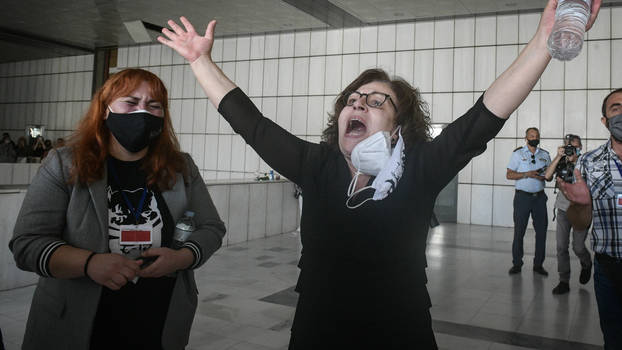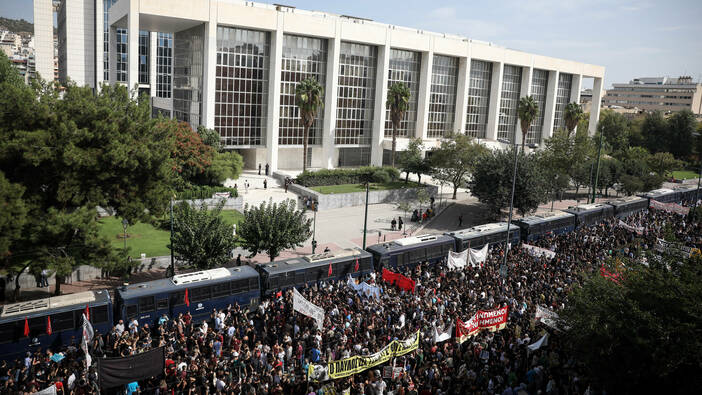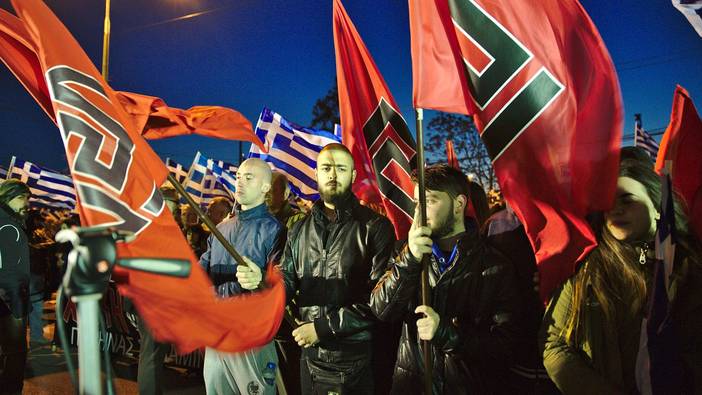
“You did it, son.” With these words and raised arms, Magda Fyssas, mother of the rapper Pavlos Fyssas who was murdered in 2013 by a member of the Golden Dawn, left the court on 7 October 2020. A few minutes earlier, the presiding judge announced what is probably the most important trial verdict in Greece since the military dictatorship (1967–1974): the seven-member leadership of the Golden Dawn party was found guilty of directing a criminal organization. A further eleven defendants (all former members of parliament) were convicted of membership in such an organization.
Tens of thousands of people with flags, banners, and masks stood in front of the court. A broad alliance of civil society groups, leftists and anarchists, political parties and associations responded to the call put out by the Fyssas family and the campaign “They Are Not Innocent—Nazis in Jail”. The jubilation when the verdict was announced was indescribable. A magical moment. Not a minute later, the police attacked with water cannons and tear gas. Welcome to Greece.
Maria Oshana is head of the Rosa-Luxemburg-Stiftung’s Regional Office in Athens, Greece. This article appeared first in der Freitag. Translation by Loren Balhorn.
Sixty-eight defendants had to answer for four charges at the trial: for the murder of Pavlos Fyssas in September 2013, for the attempted murder of the Egyptian fisherman Abouzid Embarak in June 2012, for the attempted murder of trade unionists including trade union president Sotiris Poulikogiannis in September 2013, and finally for membership in a criminal organization.
This was not a matter of banning a political party, which is not foreseen in Greek law, but of a criminal trial in which it had to be proven that “the ‘Golden Dawn’ is a criminal organization disguised as a legitimate political party”, as the lawyer Thanasis Kabayannis, who participated in the trial as a joint plaintiff, explains. Nevertheless, the verdict means the end for this gang of old and new Nazis, which had also been a party since 1993 and was represented in parliament from 2012 to 2019. One week after the verdict, the sentence for the leadership was set at 13 years imprisonment, and the murderer of Pavlos Fyssas, Roupakias, was given life.
Not Defenceless against Nazis
Neither the tear gas of the police nor the pathetic efforts of the defence to present the perpetrators as innocent citizens can take away the joy and relief many people in Greece feel these days. It would have been unthinkable for the judges to acquit the Nazi organization, as the prosecutor demanded back in December. Eight million euro in public funds for the party which had been frozen during the trial would have been released, and shuttered party offices would have reopened nationwide. An acquittal would also have been tantamount to recognizing the Golden Dawn as a “normal” party. Right-wing radicals throughout Europe would have rejoiced.
This is another reason why the verdict is so important beyond Greece itself. Even if it only temporarily sets limits to a culture of impunity against fascist ideology and racist violence, the victory remains. It shows that society is not completely defenceless, that battles can be won—even in court.
The verdict on 7 October thus made history, at least Greek history, all the more. On this day, the biggest Nazi trial in many years came to an end, a day on which justice was done. 7 October does not mark the end of the fight against fascism, but it is a great day for all antifascists and the victims of racist violence and propaganda. Today we celebrate, tomorrow we continue to fight.


